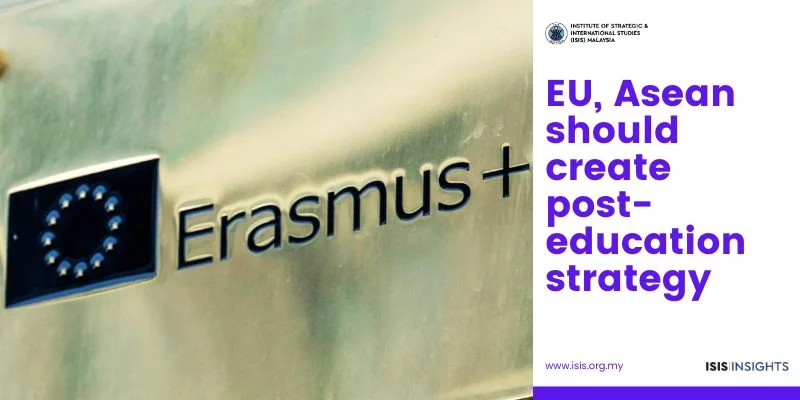Alumni unable to land jobs despite landing prestigious scholarships
Education has always been at the heart of the European Union-Asean partnership and educational cooperation remains the most meaningful people-to-people connectivity between the two groupings. Asean is part of initiatives, such as Erasmus+ and EU SHARE.
According to the State of Southeast Asia 2022 survey report published by the Asean Studies Centre at ISEAS-Yusof Ishak Institute, the EU features in the top three preferred tertiary education destinations for Southeast Asia for the second year in a row. This alludes to the preference for EU higher education institutions, an overall appreciation for its scholarship systems and even fondness for the student experience there.
Perhaps one of the most unique and holistic initiatives is Erasmus+ – the programme to support education, training, youth and sport in Europe. It offers mobility and opportunities in higher education, vocational education and training, school education, youth, adult education and sport. All Asean members are eligible for Erasmus+ subject to specific criteria.
The Erasmus Mundus Joint Master’s scholarships are high-level and integrated study programmes at the master’s level. In 2020, the EU awarded full scholarships to 176 students from Asean. Between 2014 and 2020, more than 900 students and lecturers benefited from the master’s programme. Igor Driesmans, EU ambassador to Asean, underlined that the scholarships broadened recipients’ horizon and presented valuable lessons brought back to their home countries.
Another significant initiative is the European Union Support to Higher Education in the Asean Region or EU SHARE. This programme is aimed at strengthening regional cooperation and enhancing the quality, regional competitiveness and internationalisation of Asean higher education institutions and students.
EU SHARE is a flagship project that aims to promote regional harmonisation of higher education and introduce an Asean scholarship. Launched in 2015, EU SHARE is a €15 million (RM71 million) grant funded programme. The lastest phase will support 300 students by the end of 2022.
Horizon Europe, the EU’s key funding programme for research and innovation, also facilitates collaboration and strengthens the impact of robust partnerships in tackling global challenges, such as climate change. This programme is also connected to EURAXESS Asean, allowing talented researchers to explore and develop their careers in Europe.
What is laudable about these initiatives and programmes is that they essentially deter the phenomenon of “brain drain”. Students engaged in these programmes develop networks, skills and gain invaluable experience in the EU but return home with the hope of applying these skills locally.
Hence, there is a political undertone to this cooperation – it supports human development and people-to-people connectivity but not at the expense of displacing these new talents from the home country.
The challenge, however, is that these alumni end up being highly qualified, well connected and often experts in a niche subject (for example, European policy studies) but there is a structural mismatch which results in reduced employment opportunities. The same goes for those in the field of scientific research. Alumni may not be able to apply what they’ve learnt possibly due to vastly different scientific research environments in the EU and Asean.
What are the best ways to address this educational conundrum? EU and Asean policymakers must find a middle ground and invest in the “after” or post-education environment. Both must make better use of existing monitoring structures not only to keep track of the number of Erasmus+ graduates and alumni but also their fields of expertise and perhaps initiate job-matching activities or even permanent frameworks for this purpose.
If “brain drain” is the major concern, perhaps employment exchange, where EU and Asean citizens can take up jobs in locations based on expertise. After all, it is well documented that since 2014, nearly 3,000 European students and staff have taken up work or study in Asean member states under the Erasmus+ programme.
It is rather perplexing that there is no mention of the Erasmus+ Students and Alumni Alliance (ESAA) in the EU-Asean Strategic Partnership Blue Book 2022 – indicating that it has not sufficiently contributed to the EU-Asean relationship. The ESAA is an umbrella alliance that offers a dynamic platform for networking and professional development. Perhaps this platform can play an important role in developing a sustainable post-education strategy.
The EU remains Asean’s most important and dynamic partner when it comes to education cooperation. However, as a means of improving the current strategy and making it more sustainable and enhancing its value, EU and ASean must invest in developing a post-education strategy that ensures Erasmus+ and EU-SHARE alumni gain relevant employment.
This will contribute better to the objectives of a more talented and skilled workforce in both regions and a stronger EU-Asean strategic partnership that reiterates the value of the long-time relationship.
* The EU-Asean commemorative summit will take place in Brussels on 14 December.





